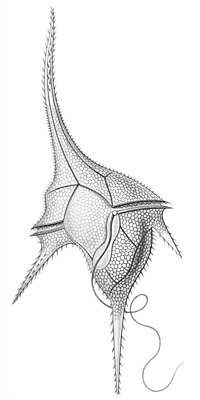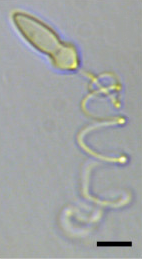
Accumulation and depuration of paralytic shellfish toxins by Australian abalone Haliotis rubra: Conclusive association with Gymnodinium catenatum dinoflagellate blooms
Sign Up to like & getrecommendations! Published in 2017 at "Food Control"
DOI: 10.1016/j.foodcont.2016.10.012
Abstract: Paralytic shellfish toxins (PST) were detected in abalone (Haliotis rubra) in April 2011 in south-east Tasmania, Australia, during a dinoflagellate bloom of Gymnodinium catenatum. This led to restrictions on abalone harvesting and triggered continued PST… read more here.
Keywords: abalone haliotis; abalone; shellfish toxins; dinoflagellate ... See more keywords

JA signal-mediated immunity of Dendrobium catenatum to necrotrophic Southern Blight pathogen
Sign Up to like & getrecommendations! Published in 2021 at "BMC Plant Biology"
DOI: 10.1186/s12870-021-03134-y
Abstract: Background Dendrobium catenatum belongs to the Orchidaceae, and is a precious Chinese herbal medicine. In the past 20 years, D. catenatum industry has developed from an endangered medicinal plant to multi-billion dollar grade industry. The necrotrophic… read more here.
Keywords: pathogen; plant; delphinii; dendrobium catenatum ... See more keywords

Identification and Expression Analysis of WRKY Gene Family in Response to Abiotic Stress in Dendrobium catenatum
Sign Up to like & getrecommendations! Published in 2022 at "Frontiers in Genetics"
DOI: 10.3389/fgene.2022.800019
Abstract: Dendrobium catenatum has become a rare and endangered medicinal plant due to habitat loss in China. As one of the most important and largest transcription factors, WRKY plays a critical role in response to abiotic… read more here.
Keywords: stress; family; response abiotic; expression ... See more keywords

Preparation, Structural Features and in vitro Immunostimulatory Activity of a Glucomannan From Fresh Dendrobium catenatum Stems
Sign Up to like & getrecommendations! Published in 2022 at "Frontiers in Nutrition"
DOI: 10.3389/fnut.2021.823803
Abstract: Dendrobium catenatum polysaccharides (DCPs) have attracted attention due to their multiple physiological activities and health benefits. In this study, a novel water-soluble DCP was obtained from fresh D. catenatum stems through three-phase partitioning and ethanol… read more here.
Keywords: catenatum stems; vitro immunostimulatory; dendrobium catenatum; immunostimulatory activity ... See more keywords

Developmental Characteristics and Auxin Response of Epiphytic Root in Dendrobium catenatum
Sign Up to like & getrecommendations! Published in 2022 at "Frontiers in Plant Science"
DOI: 10.3389/fpls.2022.935540
Abstract: Dendrobium catenatum, a traditional precious Chinese herbal medicine, belongs to epiphytic orchids. Its special life mode leads to the specialization of roots, but there is a lack of systematic research. The aerial root in D.… read more here.
Keywords: root; characteristics auxin; developmental characteristics; dendrobium catenatum ... See more keywords

Genome-Wide Identification and Expression Analysis of the Chalcone Synthase (CHS) Gene Family in Dendrobium catenatum
Sign Up to like & getrecommendations! Published in 2023 at "Agronomy"
DOI: 10.3390/agronomy13061488
Abstract: Flavonoids are considered to be critical metabolites in regulating plant responses to abiotic stress. Chalcone synthase (CHS) catalyzes the first key step in the flavonoid biosynthesis pathway. However, there is no in-depth information on the… read more here.
Keywords: chalcone synthase; genome wide; analysis; synthase chs ... See more keywords

Glucomannan in Dendrobium catenatum: Bioactivities, Biosynthesis and Perspective
Sign Up to like & getrecommendations! Published in 2022 at "Genes"
DOI: 10.3390/genes13111957
Abstract: Dendrobium catenatum is a classical and precious dual-use plant for both medicine and food in China. It was first recorded in Shen Nong’s Herbal Classic, and has the traditional functions of nourishing yin, antipyresis, tonifying… read more here.
Keywords: bioactivities biosynthesis; glucomannan; glucomannan dendrobium; dendrobium catenatum ... See more keywords

Population Diversity Analysis Provide Insights into Provenance Identification of Dendrobium catenatum
Sign Up to like & getrecommendations! Published in 2022 at "Genes"
DOI: 10.3390/genes13112093
Abstract: Dendrobium catenatum (Dendrobium officinale) is a valuable genuine herb. The source of this species is difficult to be identified by traditional methods including morphology, spectroscopy, and chromatography. We used the restriction site-associated DNA sequencing (RAD-seq)… read more here.
Keywords: identification; diversity; catenatum population; dendrobium catenatum ... See more keywords

Effect of Different N:P Ratios on the Growth, Toxicity, and Toxin Profile of Gymnodinium catenatum (Dinophyceae) Strains from the Gulf of California
Sign Up to like & getrecommendations! Published in 2022 at "Toxins"
DOI: 10.3390/toxins14070501
Abstract: The harmful microalgae Gymnodinium catenatum is a unique naked dinoflagellate that produces paralytic shellfish poisoning toxins (PSTs). This species is common along the coasts of the Mexican Pacific and is responsible for paralytic shellfish poisoning,… read more here.
Keywords: gymnodinium catenatum; growth; different ratios; toxin ... See more keywords

Influence of static magnetic fields in phototaxis and osmotic stress in Gymnodinium catenatum (Dinophyceae).
Sign Up to like & getrecommendations! Published in 2017 at "General physiology and biophysics"
DOI: 10.4149/gpb_2016052
Abstract: Phototaxis response of the toxic microalgae Gymnodinium catenatum was studied in vitro. The percentage of cells remaining at mid-depth 20 min after stirring increased with solar radio, X-ray and solar flares output. It also increased… read more here.
Keywords: gymnodinium catenatum; static magnetic; influence; catenatum ... See more keywords

Identification and analysis of sucrose synthase gene family associated with polysaccharide biosynthesis in Dendrobium catenatum by transcriptomic analysis
Sign Up to like & getrecommendations! Published in 2022 at "PeerJ"
DOI: 10.7717/peerj.13222
Abstract: Background Dendrobium catenatum is a valuable traditional medicinal herb with high commercial value. D. catenatum stems contain abundant polysaccharides which are one of the main bioactive components. However, although some genes related to the synthesis… read more here.
Keywords: gene; associated polysaccharide; sucrose synthase; analysis ... See more keywords